Blog
Blog » 3 KEY CHANGES IN HUNGARIAN DEBT COLLECTIONS FROM 2018
3 KEY CHANGES IN HUNGARIAN DEBT COLLECTIONS FROM 2018
05 February 2018
From 2018 the small claim collection rules are changing in Hungary, and foreign creditors must comply with residency conditions so that they can start payment warrant procedure. At the same time, businesses do not have to waste time before starting litigation. Read our summary to know more on this topic!
 Mandatory Payment Warrant Procedure up to HUF 3 Million
Mandatory Payment Warrant Procedure up to HUF 3 Million
From 2018 the Payment Warrant Procedure (PWP) becomes mandatory for monetary claims not exceeding HUF 3 Million. So in case your claim is less than HUF 3 Million, you have to start your case in front of the notary public, and request the payment warrant.
The PWP is not compulsory, but it is still an option for claims between HUF 3 Million and 30 Million HUF. In these cases you can choose between starting your case in front of the notary public, or in front of the competent court.
If your claim is above 30 Million, the payment warrant procedure is not an option anymore, so you can go directly to court.
Residency condition for Payment Warrant Procedure
From 2018, not only the debtor, but also the creditor must have its registered seat (commercial representation or financial branch office) in Hungary, in order to be eligible for starting payment warrant procedure.
When it comes to private individuals, the address or habitual residence of both the creditor and debtor must be in Hungary.
In case you are a foreign business, without any kind of commercial representation in Hungary, you can not opt for the Payment Warrant Procedure, so you must either start litigation, or you can try the European payment order procedure.
No more mandatory conciliation before litigation
Earlier, businesses had to try to conciliate among themselves, in order to find an out-of-court settlement. So before starting litigation in front of court, plaintiffs had to send a notice letter to debtors attempting conciliation and settlement.
From 2018, there is no more need to send a legal notice letter to your debtor before suing him in front of court, and if you think that attempting an out-of-court settlement is just the waste of time, you do not have to do this.
Summary of debt collection procedures in Hungary from 2018
If your Hungarian business partner owes you money, your options as creditor are summarized in the table below

-
When should employers pay the consideration for non-compete obligation in Hungary?
The Hungarian Labour Code does not specify the due date of the consideration for non-compete obligation, which resulted in legal uncertainty. Based on the recent case law, the judiciary filled this gap with legal interpretation. In our article we summarize this recent development in Hungarian labour law practice.
Read more » -
ARBITRATION PROCEEDINGS IN HUNGARY
The Hungarian arbitration procedure, compared to the Hungarian state court procedure, is much simpler, less formal. However, it is still necessary to know these simpler procedural rules, to conclude the dispute successfully. Consequently, we summarize below the most important procedural principles and rules based on the Hungarian Arbitration Act and on the Rules of Procedure.
Read more » -
Can Parties Choose a Foreign Court in a Purely Domestic Transaction in the EU?
Can the parties domiciled in the same EU Member State conclude a choice-of-court agreement conferring jurisdiction on the court of another EU Member State in a purely domestic transaction? Should the choice of a foreign court be considered as a sufficient international element, in itself, to trigger the application of the Brussels Ibis Regulation? The CJEU decided this long-standing debate between subjectivist and objectivist approaches to “internationality” in a recent judgment.
Read more »